You are living amid the first global mass trauma event for several decades. It's arguably the first of its kind since World War Two, and likely the first of such severity in your lifetime.
At the time of writing, more than two million lives have been lost, and the number continues to rise by tens of thousands every day. The global economy, complex webs of international relations, individual mental health, the pitter-patter of everyday life: nothing has been spared in the viral storm.
When thinking about Covid-19, though, "trauma", let alone "mass trauma", may not be the first thing that springs to mind. Other frames of reference – economic, political, ecological, scientific – may seem more fitting. And even within a mental health lens, "trauma" has hardly been the go-to in media discussions, which focus more on other problems like depression, anxiety, loneliness, and stress.
Trauma is a far subtler concept than many of us realise. It isn't just a word for something extremely stressful. It doesn't always come from short, sharp shocks like car accidents, terrorist attacks, or firefights. And, trauma isn't the same thing as post-traumatic stress disorder (PTSD). What trauma is about is events and their effect on the mind. But what separates it from something merely stressful is how we relate to these events on a deep level of belief.
After the pandemic ends, the effects of the mass trauma it has inflicted will linger across societies for years. How might we understand this mental fallout? And what does the science of trauma suggest that we should – and shouldn't – do in order to heal?
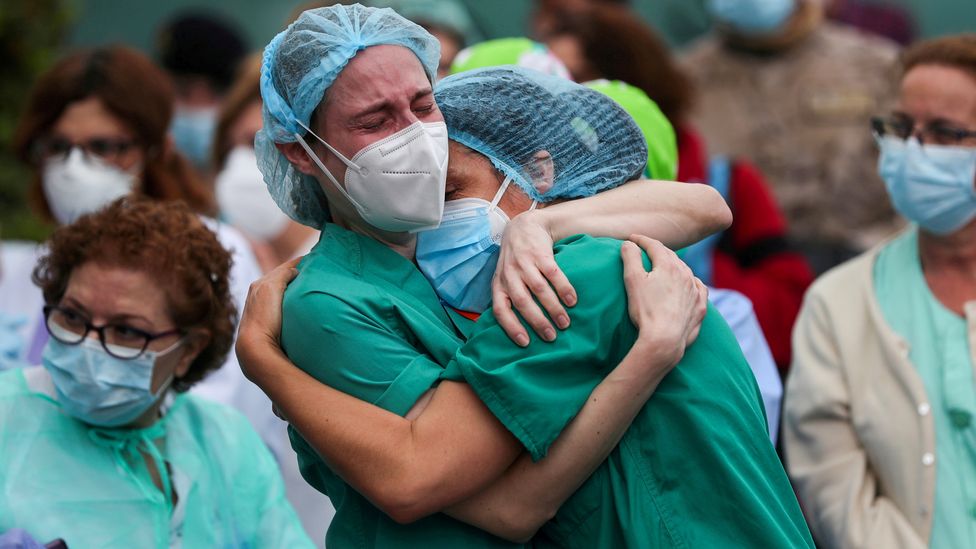
Health workers embrace following the death of a colleague in Spain (Credit: Susana Vera/Reuters)
Trauma can be understood as a rupture in "meaning-making", says David Strickey, a psychiatrist and representative of the UK Trauma Council. When "the way you see yourself, the way you see the world, and the way you see other people" are shocked and overturned by an event – and a gap arises between your "orienting systems" and that event – simple stress cascades into trauma, often-mediated through sustained and severe feelings of helplessness.
Even our most everyday tragedies stand as potential pits for trauma. Being fired from a job, for example, can be highly traumatic. One's identity, the foundation of a "personal GPS", is often tied to work and its execution. A job provides self-esteem, purpose and a social network, as well as comprising the activities of much of waking life. Being unexpectedly fired overturns this all. Stress accumulates and the nervous system is forced on high-alert.
One's mental resilience, the oil that churns our cognitive machine and keeps us moving in stress, is depleted. And if nothing fills the gap – nothing external to define and evaluate your worth, no other reasons to go on, nothing to explain the why, what, and how of each day – for some time, one can become unmoored. It takes an update and reframing of your beliefs and sense of self, a new round of "meaning-making", to work through the trauma's impact.
Trauma is not necessarily proportional to an event's intensity. Some people will process what has happened better than others, and as Strickey points out, our meaning-making is not uniform. As well as there being no necessary relationship between the apparent strength of our belief systems and their application in trauma, "it can actually depend on what sort of day you're having", says Strickey. "It's really difficult to work out what's going to be traumatic for whom."
When trauma goes viral
Yet even with a more developed understanding of trauma, the idea of a "mass trauma" may raise questions. If trauma is about the interface of events and individual minds, what makes a mass trauma possible? Can groups themselves be traumatised? And why might Covid-19 be a case study?
At its simplest level, a mass trauma (otherwise known as a "collective trauma") takes place when the same event, or series of events, traumatises a large number of people within some shared time span. And while it lacks the graphic and accelerated intensity of a war or terrorist attack, Covid-19 is in many ways a textbook case.
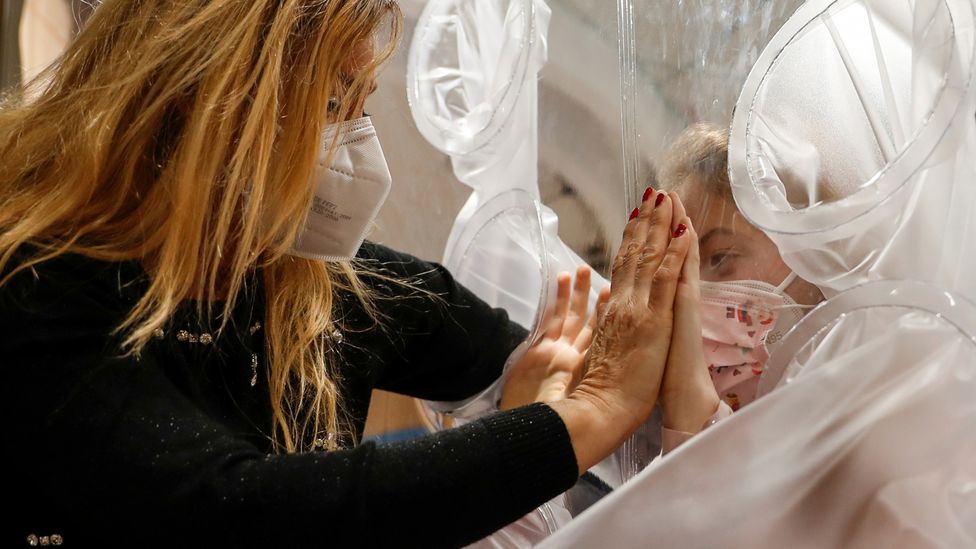
The normal ways we cope with illness, death and grief have been totally disrupted by the pandemic (Credit: Yara Nadi/Reuters)
Most obviously, the pandemic is creating bereavement on a huge scale. Death traumatises, always and everywhere. For loved ones, the rapid deteriorations seen in some Covid-19 cases – when patients go from mildly symptomatic to death's door in days – make emotional preparation hard to square. Restricted hospital visits render closure and conversations cumbersome. The mourning rituals that follow death have been turned upside down, too, with funerals socially distanced and cut in headcount. The continual reminders of the virus can trigger toxic memories and re-traumatise. Magdalena Zolkos, a philosopher at Goethe University in Frankfurt, Germany, puts it this way: with "collective inability to process in the present", the dead "might return to haunt, but belatedly".
In hospital wards, nurses and doctors face considerable traumatic potential. According to one survey, after working in isolation with critically ill patients, around 20% of healthcare workers face post-traumatic effects. Surrounded daily by death, resource constraints, and vivid imageries of tubes and life support machines, workers face an additional element of trauma through "moral injury": when their self-identity as ethical human beings is taken to the brink by decisions over who lives and dies.
Catching a severe case – with an estimated one-fifth of the virus' millions of patients requiring hospitalisation – can also be a considerable trauma. Terrifying brushes with death, the devastations of loved ones, and the characteristic disease symptoms themselves may be overwhelming.
"Being unable to breathe is the most traumatic event you can imagine", says Metin Basoglu, a founder of the trauma studies faculty at King's College London. "Simply because there's nothing you can do about it. Once you are out of breath, it is a prime example of helplessness." This is a quality that so often pushes intense stress to the realm of trauma.
Read more:
- What we know about Covid-19 variants
- How Covid-19 might mutate in the future
- Can the legacy of trauma be passed down the generations?
What makes Covid-19's trauma truly "massive", though, is its impact on the entire population – including those who will never catch the virus or even know people who have. For many, the prospect of catching a deadly invisible disease, however unrealised, is obviously and intrinsically frightening. It invites what researchers call "interoceptive fear": when our source of stress isn't an obvious threat in the external environment, but our interpretation of the body's (probably normal) mechanical processes.
Plus, against the sedate stasis of locked-down life, the virus' exponential spread is difficult to comprehend. Our very sense of real life and its rhythms is disrupted, and anecdotal reports of distorted time, "a year of fog", and scatterbrain abound. This isn't helped by Covid-19's constant attention in the media, either. The relay and repetition of pandemic news, while necessary, risks "vicarious traumatisation", when frightening stories trigger feelings of traumatic stress in those who haven't caught the disease. For example, a survey of psychotherapists who had heard about traumatic pandemic experiences from their patients found that around 15% felt "high levels" of vicarious trauma, with the average respondent facing still "moderate levels".
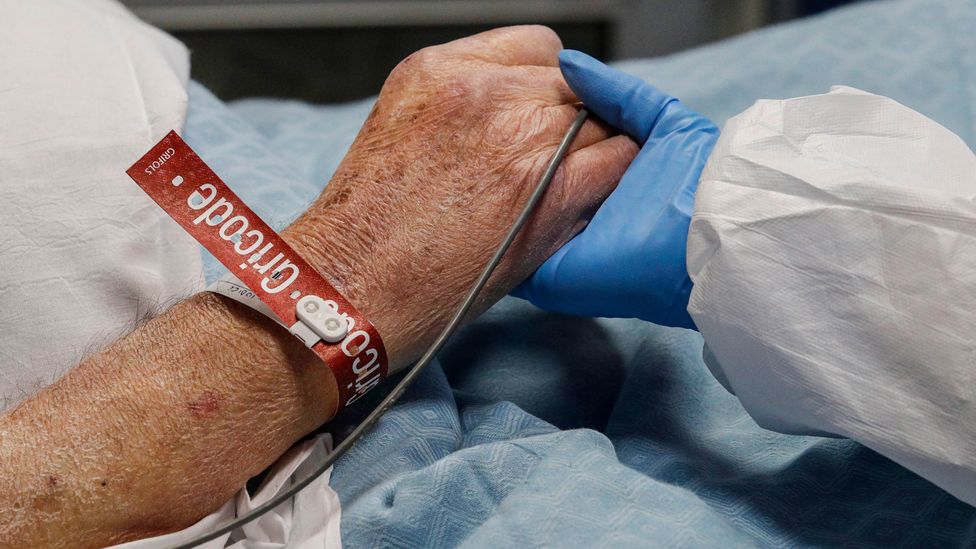
In hospital wards, nurses and doctors face considerable traumatic potential (Credit: Giuseppe Lami/EPA)
That the environment isn't obviously threatening, too, is part of the problem. The ordinary world – the friends, family, neighbours, places, that comprise normality – still looks and feels the same, but it has been reframed as a space fraught with physical dangers. The foundations of our worldview – the very things towards which we'd turn when under pressure from more tangible threats – are undercut. It's a Catch-22 at a basic level.
The dilemma is also more practical. In times of mass trauma, whether during rocket attacks in Israel and Palestine, or turbulence on Hong Kong campuses, the evidence is clear that communal gatherings and social networks are essential for adequate recovery. With Covid-19, though, meeting other people is precisely what spreads the virus. The treatment for mass trauma in one case is the problem in ours.
More tangibly, the global economic slowdown created by Covid-19 and lockdowns has pushed millions into times unknown. Bankruptcy, unemployment, life plans up-ended: findings from the 2008 recession indicated a clear and chronic spike in mental ill health.
"If one person is unemployed, that's a personal crisis of meaning," says Gilad Hirschberger, a social psychologist at Interdisciplinary Center Herzliya, a private research college in Israel. "But when a large percentage of the population of this country no longer work, then that becomes a crisis of meaning [for the system]." For those still in jobs, fresh transitions to remote working can prove subtly traumatic. "The definition of who they are changes," says Hirschberger.
Children's exposure to vicarious and non-vicarious mass trauma is especially critical. Since their narrative anchors are less concrete than adults, children are at once more adaptable but also more sensitive. "They could develop a view of the world which is pretty terrifying," says Strickey of the UK Trauma Council. "You know, 'My parents aren't coping; the world is unsafe; and the people that should be looking after us aren't doing their job.' And that does lead, if we're not careful, to a permanent colouring of your view of things. I often think of it as a lens.
"You have a lens through which you see the world, yourself and other people. And events will colour that lens. [With enough stress], even when those events have stopped, some people are left with a coloured lens."
If some children are traumatised for the long-term, Covid-19 risks being an intergenerational phenomenon once they grow up and have kids of their own. They could transmit their trauma through encouraging unconscious imitation, deliberate and conscious conditioning, or even possibly epigenetics, when traumatic stress materially alters a genetic inheritance (although research is early-stage). Studies of Aboriginal Australians, for example, have linked disparities and low outcomes in education completion, employment, infant mortality and other social metrics to the ripples of historic traumas.
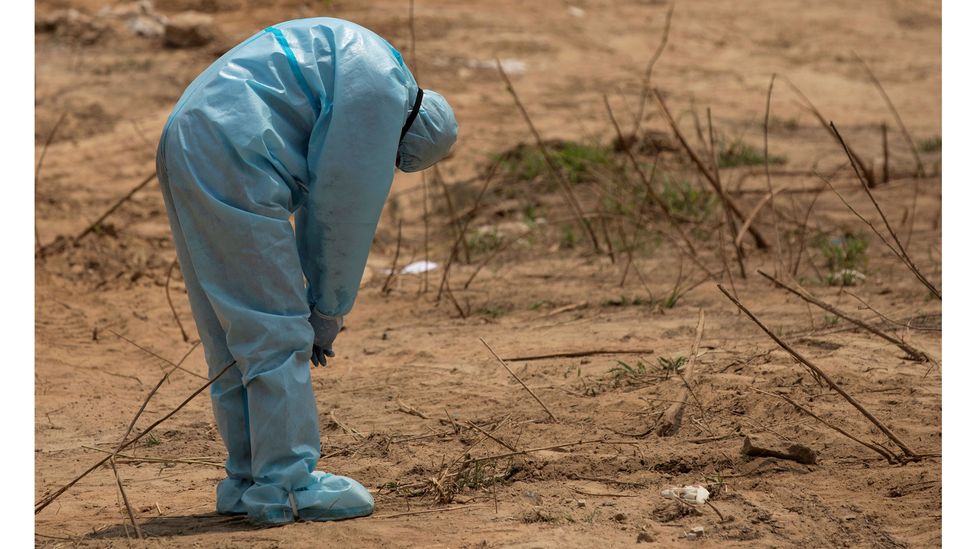
In a graveyard in India, a health worker reacts before a funeral (Credit Danish Siddiqui/Reuters)
Perhaps mass trauma’s biggest problem is its quantity. When the minds of thousands (in Covid-19's case, possibly tens of millions) of people worldwide are traumatised in quick succession, it places enormous pressure on mental health infrastructure – and not least amid the kinds of social and economic duress that usually follow a systemic shock.
The how and what of a purely psychiatric response would require an article unto itself. Addressing mass trauma will also take more than psychiatry, Basoglu urges. The scale of the problem means that meaning-making tools "should be delivered through media channels: in writing, in booklets and videos, kids' channels, TV channels, newspapers, all avenues of information, any information channel, the internet".
The effects of mass traumas are more than psychological, says Basoglu, but spread out to impact society more broadly. Once large numbers of people are traumatised – their relationships altered, their connection to broader social systems ruptured, their function as citizens undermined – "they have social effects, they have economic effects, they have political effects".
A study of mass trauma survivors in China, for example, found their political participation permanently decreased. Mass trauma may even create a collective yearning for strong leaders, accelerating authoritarianism and fomenting the conditions for rash, seemingly decisive policy responses. And as a group-affecting phenomenon, mass trauma alters and activates the subtler ways in which groups are bound together: in other words, the cornerstones of meaning-making, the independent variable of trauma, on a group level.
Groups vs individuals
Social psychologists have called them "the basic tissues of social life": common origin stories, expectations of conduct, rituals, shared institutions and social spaces, a sense of destiny, their relationship with "the other", who "the other" may be. In parallel to the traumatised individual, whose own psychic tissues are torn to bits by an event, mass trauma risks a blow to the group's social tissues, and one so severe that its core self could be jeopardised.
Jeffrey Alexander, a sociologist at Yale, has noticed the impact of Covid-19 in subtle and damaging ways. The US's social tissues, for example, are consumed by a "feeling of chaos, being out of control, as if the country is falling apart" wrought by the pandemic, he says.
And the US's mass trauma has been a double-whammy, Alexander suggests. The Black Lives Matter protests in May, combined with growing knowledge of stark racial inequalities in viral deaths, has led Covid-19 to intersect with more longstanding historical traumas around race. Evidence suggests that people of colour, and black Americans especially, face intergenerational traumas from racism and discrimination. These events have raised fears of a cascading collective trauma with more damaging implications.
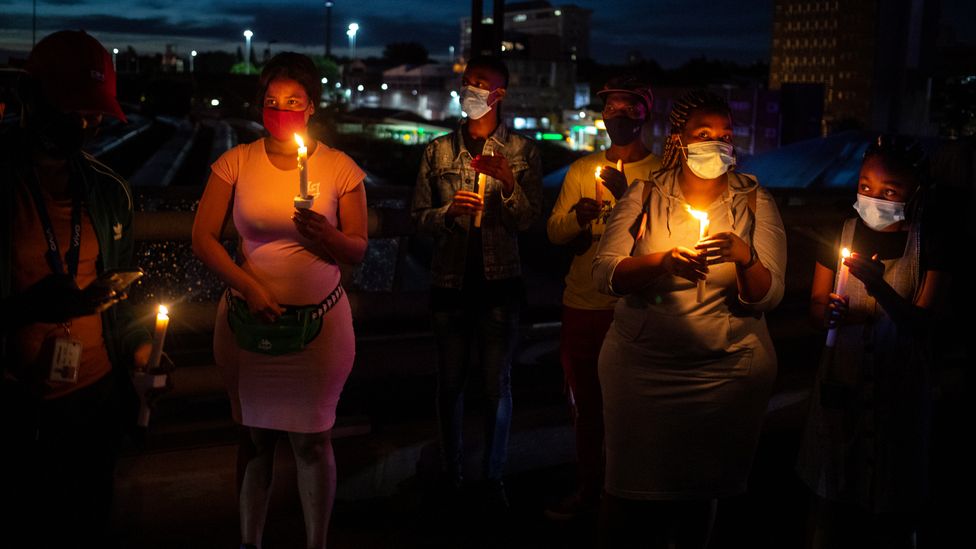
A memorial for victims of coronavirus in South Africa (Credit: Kim Ludbrook/Getty Images)
In some cases of mass trauma, the group's social tissues can adapt and overcome. If a mass trauma is linked explicitly to group identity it can, after some time of destruction and dislocation, provide an irreplaceable ingredient for a new round of meaning-making. Using the example of the Holocaust, Hirschberger wrote that the group's relationship with the trauma, and their endeavour to transcend, process and embed it in rituals and conversation, "becomes the epicentre of group identity".
Clearly, however, Covid-19 isn't an existential threat to single groups like the Holocaust was. Part of its traumatic profile altogether is the virus' globality. Yet in our scrambling for meaning, the invocation of national and regional myths has been fairly common. In England, the experience of the Blitz – a cornerstone of "national memory" – is called upon frequently, and designed to reinforce much-needed feelings of communality and neighbourly gesture. Discussions of WWII, perhaps our most comparable point of reference, are also common, as is the general notion of fighting a war against the virus. Former President Trump compared Covid-19 to the 1941 Pearl Harbour attack, and catalysed longstanding tropes of China, the "other", as a land of disease.
The problem of forgetting
Perhaps more than anything else, though, the lasting social dangers of mass trauma consist in forgetting. When it goes unprocessed, undiscussed, perhaps actively repressed, the group's social tissues remain disturbed and unhealed. Individual trauma builds up unrecognised and festers under the cracks.
In Lebanon, war-affected communities have been seen to occupy "sequential traumatisation", or cycles of "hyper-arousal" and "numbing", as have traumatised refugee groups in Syria and Palestine. Exposed to reminders of an unprocessed trauma, individuals may act in fits of aggression and anxiety. Or in the hope of preventing re-exposure to triggers, they may act with "avoidance, apathy or passivity". On a group level, there may be cyclical episodes of violence and aggression against others, followed by withdrawal. Sometimes, officials may even pretend the original traumatic events never happened, including the censorship of school textbooks. In the delicate politics of a new leadership, such forgetting – a fatal attraction for traumatised communities – can form an especially potent engine of grievance and social tension.
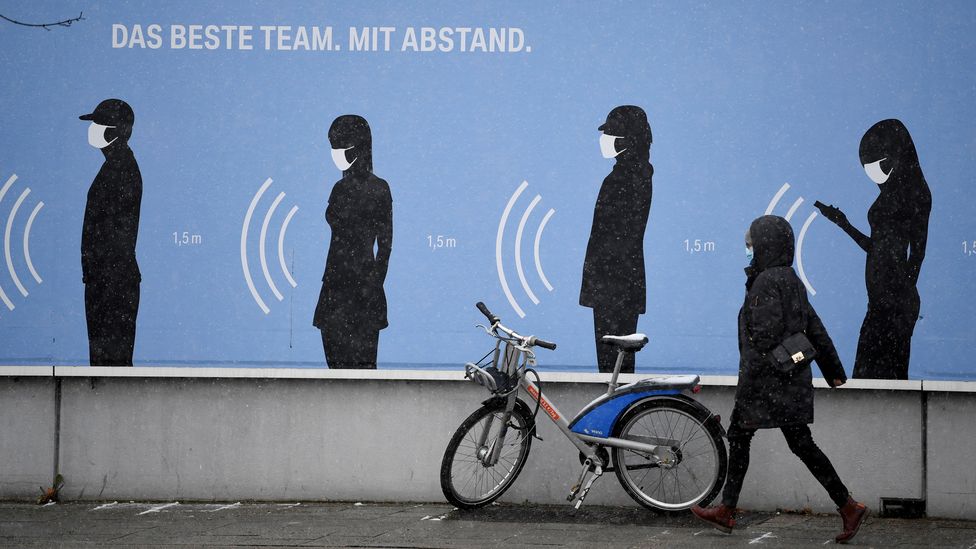
A woman walks next to a poster in Germany reading "The best team. With distance" (Credit: Andreas Gebert/Reuters)
With this in mind, perhaps it's surprising that Covid-19 may prove dangerously easy to forget. That's what history suggests, at least. The last global pandemic, the 1918 flu, has been so sequestered in national memories that commentators have called it the "Forgotten Flu". At least 50 million people succumbed to the virus worldwide, but on the surface it would seem to have made no dent on the public face of our social tissues.
Art, literature, and memoirs, for example, are frequent keystones for remembering. Yet the 1918 flu did not seem to inspire much of note. Media attention ran dry, and public acknowledgements were slim. Except in New Zealand, no country instituted any national memorial process, whether it be statues, plinths, monuments, days of remembrance, moments of silence, or other instruments, at all. Martin Bayly, a social scientist at the London School of Economics, reviewed the archives in the UK, where some 250,000 people died. "I couldn't find any evidence of any public commemoration whatsoever," he says. "And the absence of commemoration meant that it did fade away in public memory, in the writing of history."
By 1935, medical historians would catch on – some understandably perplexed – to the forgetting of the 1918 flu. Decades later, activists in the Aids and Ebola outbreaks would take extra efforts in remembrance, conscious of slipping from historical view. And why the 1918 flu exactly got "forgotten" is a complex question of history. The overriding impact of WWI, Bayly acknowledges, cannot be understated. But subsequent pandemics, like in 1957 and 1968, went un-commemorated and unremembered, too, despite claiming tens of thousands of lives globally.
That we keep forgetting pandemics may, in fact, hold a mirror to their very nature. Remembering and making meaning of pandemic trauma is difficult, because compared with other kinds of mass trauma, disease deaths simply aren't as "tellable" or "narrativised". Do they have a "point", like the deaths from war? Who is the foe that we defeated when the enemy is within? What immediate story does a pandemic evoke in people's minds? What's the "never again" cautionary tale?
Phrased differently, pandemics are rarely wholesale "problems of commission", when the trauma arises from the clear and malicious decisions of certain individuals and groups. This makes answering the "how, why, and who" behind the trauma all the more challenging. While human agency has played an undeniable role in its spread, "nobody's trying to infect everybody with Covid-19", says Hirschberger. "It's just something that's a product of how we live and all of humankind,"
However hard it may be to implement, not commemorating is a decision in itself.
From the outset, it makes forgetting – with its attendant risks to individual mental health and social cohesion – more likely. Not commemorating may even affect our preparedness for future crises. Amid the 1957 pandemic, observers remarked that we'd "completely failed to learn the lessons of 1918", says Bayly. And with 1957 forgotten, too, he suggests that our awareness of pandemic risk – and our response to Covid-19 – would have been much-enhanced if we'd actively tried to remember our own past.
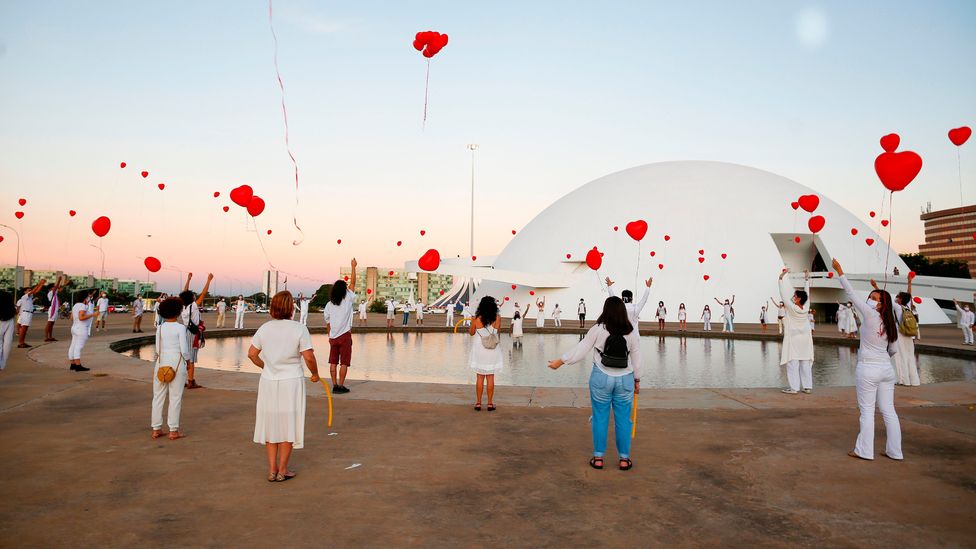
Rituals and memorialisation would serve us better than trying to forget (Credit: Sergio Lima/Getty Images)
National commemoration is more important still. In offering meaning-making and a channel for grief, it processes mass trauma on its own scale. A top-down commemoration is only enhanced when combined with bottom-up approaches – art, local memorials, digital archives, and simply people's personal memories – now more shareable than ever with the second-by-second of social media.
Covid-19 commemoration efforts are underway and already appear promising. In the UK, amid the complexity and muddied character of the pandemic, the national narrative looks set to centre on the role of the NHS and key workers: a meaning-making framework both cross-partisan, deeply symbolic, and rich with social lessons. As well as the real-time commemoration of the "Clap For Carers", a moment of silence was declared for the evening of 4 July, prior to the NHS's birthday the following day. There have been calls for a "999" monument in central London, a monument to NHS workers at the National Arboretum, and a memorial to deceased transport workers at Victoria Station.
Together with Katharine Millar and Yuna Han at LSE, though, Bayly is keen for Covid-19's "common dead", the greater mass of national trauma, to be explicitly recognised, too. They've recommended a national Covid-19 remembrance day for the UK next year as a "key area for government policy".
"We're really keen that it would be a day people are not expected to work," says Millar. The government hitting the national pause button "would be an effective way to formally hold base in the public conversation and collective experience to recognise loss and trauma and suffering". Plus, the pandemic has been so sustained, so long-tailed, that it badly needs a "bookend", Millar suggests. It would be a deadline to mark a horizon, and balance the past and future.
A turning point?
Covid-19 is a mass trauma the likes of which we've never seen before. Our most complex social extensions, and the building-blocks of our personal realities, have been coloured indelibly. The ways we live and work together, and view each other as common citizens: everything means something different in the viral era, and with potentially traumatic effect.
All pandemics end, however. And this one will. But to forget the trauma, move on, and pay it no mind, won't help. It'd be a disservice to history and our own minds. Maybe to the future, too.
--
Join one million Future fans by liking us on Facebook, or follow us on Twitter or Instagram.
If you liked this story, sign up for the weekly bbc.com features newsletter, called “The Essential List”. A handpicked selection of stories from BBC Future, Culture, Worklife, and Travel, delivered to your inbox every Friday.
"how" - Google News
February 04, 2021 at 09:06AM
https://ift.tt/3pQxCkO
How to heal the 'mass trauma' of Covid-19 - BBC News
"how" - Google News
https://ift.tt/2MfXd3I
https://ift.tt/3d8uZUG
Bagikan Berita Ini














0 Response to "How to heal the 'mass trauma' of Covid-19 - BBC News"
Post a Comment